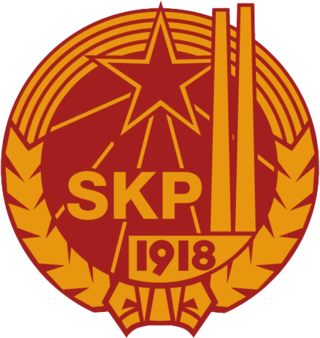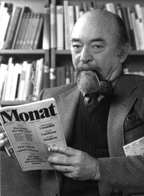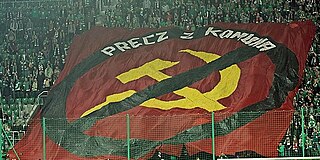Related Research Articles

The term "Soviet empire" collectively refers to the world's territories that the Soviet Union dominated politically, economically, and militarily. This phenomenon, particularly in the context of the Cold War, is also called Soviet imperialism by Sovietologists to describe the extent of the Soviet Union's hegemony over the Second World.

The Communist Party of Finland was a communist political party in Finland. The SKP was a section of Comintern and illegal in Finland until 1944.
The Congress for Cultural Freedom (CCF) was an anti-communist cultural organization founded on June 26, 1950 in West Berlin, and was supported by the Central Intelligence Agency and its allies. At its height, the CCF was active in thirty-five countries. In 1966 it was revealed that the CIA was instrumental in the establishment and funding of the group. The congress aimed to enlist intellectuals and opinion makers in a war of ideas against communism.
Encounter was a literary magazine founded in 1953 by poet Stephen Spender and journalist Irving Kristol. The magazine ceased publication in 1991. Published in the United Kingdom, it was an Anglo-American intellectual and cultural journal, originally associated with the anti-Stalinist left. The magazine received covert funding from the Central Intelligence Agency who, along with MI6, discussed the founding of an "Anglo-American left-of-centre publication" intended to counter the idea of Cold War neutralism. The magazine was rarely critical of American foreign policy and generally shaped its content to support the geopolitical interests of the United States government.

Melvin Jonah Lasky was an American journalist, intellectual, and member of the anti-Communist left. He founded the German journal Der Monat in 1948 and, from 1958 to 1991, edited Encounter, one of many journals revealed to have been secretly funded by the CIA through the Congress for Cultural Freedom (CCF).
The American Committee for Cultural Freedom (ACCF) was the U.S. affiliate of the anti-Communist Congress for Cultural Freedom (CCF).

Anti-communism is political and ideological opposition to communist beliefs, groups, and individuals. Organized anti-communism developed after the 1917 October Revolution in the Russian Empire, and it reached global dimensions during the Cold War, when the United States and the Soviet Union engaged in an intense rivalry. Anti-communism has been an element of many movements and different political positions across the political spectrum, including anarchism, centrism, conservatism, fascism, liberalism, nationalism, social democracy, socialism, leftism, and libertarianism, as well as broad movements resisting communist governance. Anti-communism has also been expressed by several religious groups, and in art and literature.
The Finnish Socialist Federation was a language federation of the Socialist Party of America which united Finnish language-speaking immigrants in the United States in a national organization designed to conduct propaganda and education for socialism among their community.

The Cultural Cold War was a set of propaganda campaigns waged by the United States and the Soviet Union during the Cold War, with each country promoting their own culture, arts, literature, and music. In addition, less overtly, their opposing political choices and ideologies at the expense of the other. Many of the battles were fought in Europe or in European Universities, with Communist Party leaders depicting the United States as a cultural black hole while pointing to their own cultural heritage as proof that they were the inheritors of the European Enlightenment. The U.S. responded by accusing the Soviets of "disregarding the inherent value of culture," and subjugating art to the controlling policies of a totalitarian political system, even as they felt saddled with the responsibility of preserving and fostering western civilization's best cultural traditions, given the many European artists who took refuge in the United States before, during, and after World War II.
The Committee for Cultural Freedom (CCF) was an American political organization active from 1939 to 1951 which advocated opposition to the totalitarianism of both the Soviet Union and Nazi Germany in foreign affairs, and promoted pro-democratic reforms in public and private institutions domestically. Co-founded by influential philosopher and educator John Dewey and the anti-Soviet Marxist academic Sidney Hook, it was reorganized in January 1951 into the American Committee for Cultural Freedom.
FORVM was an Austrian monthly cultural and political magazine, published in Vienna from 1954 to 1995, founded by Friedrich Hansen-Loeve, Felix Hubalek, Alexander Lernet-Holenia and Friedrich Torberg with the financial and logistical support of the CIA-funded Congress for Cultural Freedom (CCF). Torberg also edited the magazine from its start in 1954 to 1965. In 1965 Günther Nenning took over as editor and in 1986 Gerhard Oberschlick.

Eurocommunism was a trend in the 1970s and 1980s within various Western European communist parties which said they had developed a theory and practice of social transformation more relevant for Western Europe. During the Cold War, they sought to reject the influence of the Soviet Union and the Communist Party of the Soviet Union. The trend was especially prominent in Italy, Spain, and France.
Parnasso is a literary magazine published in Helsinki, Finland. The magazine has been in circulation since 1951. It is among the most respected literary magazines in the country.
The anti-Stalinist left is a term that refers to various kinds of Marxist political movements that oppose Joseph Stalin, Stalinism, Neo-Stalinism and the system of governance that Stalin implemented as leader of the Soviet Union between 1924 and 1953. This term also refers to the high ranking political figures and governmental programs that opposed Joseph Stalin and his form of communism, such as Leon Trotsky and other traditional Marxists within the Left Opposition.
Who Paid the Piper? The CIA and the Cultural Cold War is a 1999 book by Frances Stonor Saunders. The book discusses the mid-20th century Central Intelligence Agency efforts to infiltrate and co-opt artistic movements using funds that were mostly channelled through the Congress for Cultural Freedom and the Ford Foundation. The aim of these efforts was to combat the political influence of the Soviet Union and expand American political influence. Saunders concluded that by entangling the state in "free" artistic expression, the CIA undermined America's moral position in comparison to the Soviet Union. In Dissent Jeffrey C. Isaac wrote that the book is a "widely discussed retrospective on post-Second World War liberalism that raises important questions about the relationships between intellectuals and political power."
Valitut Palat is a monthly general-interest family magazine published in Helsinki, Finland. It is the Finnish edition of Reader's Digest.
Yön was a weekly Turkish political magazine published between 1961 and 1967. It was a Kemalist and leftist magazine. In fact, Yön was more than a publication in that its contributors represented a political movement in the 1960s, Yön movement, which was a successor of the leftist-Kemalist movement in the 1930s, Kadro movement, which also gathered around a publication, Kadro.

Mauro Scoccimarro was an Italian economist and communist politician. He was one of the founders of the Italian Communist Party and the minister of finance between 1945 and 1947.
Kansa Taisteli was a monthly men's magazine which featured articles on the memories of the war veterans. The magazine published in Helsinki, Finland, in the period 1957–1986. It was the Finnish version of Landserheft, a German magazine.
Tempo Presente was a monthly political magazine which existed between 1956 and 1967 in Rome, Italy. It was supported by the Congress for Cultural Freedom which published other magazines, including Cuadernos, Encounter, Survey and Der Monat.
References
- 1 2 3 4 Kai Ekholm. "Tilanne-lehti sai CIA: lta rahoitusta". Tiella Sananvapauteen (in Finnish). Retrieved 14 August 2022.
- ↑ R. Neal Tannahill (Winter 1976). "Leadership as a Determinant of Diversity in Western European Communism". Studies in Comparative Communism. 9 (4): 357. JSTOR 45367151.
- 1 2 3 Marek Fields (2019). Defending Democracy in Cold War Finland: British and American Propaganda and Cultural Diplomacy in Finland, 1944–1970. Leiden; Boston: Brill. pp. 347–348. ISBN 978-90-04-41642-0.
- 1 2 3 Translations on International Communist Developments. Vol. 648–658. Washington, DC: U.S. Joint Publications Research Service. 1964. p. 2-PP2.
- ↑ Joseph R. Starobin (1965). "Communism in Western Europe". Foreign Affairs . 44 (1): 69. doi:10.2307/20039144.
- ↑ Janna Kantola (2016). "Making Choices – Debatable Translations and Publication Policies of Finnish Cultural Magazines". In Tania Ørum; Jesper Olsson (eds.). A Cultural History of the Avant-Garde in the Nordic Countries 1950-1975. Vol. 32. Leiden; Boston: Brill Rodopi. p. 339. doi:10.1163/9789004310506_033. ISBN 9789004310506.